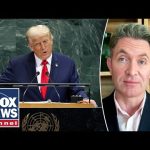Senator Lindsey Graham’s push for powerful new sanctions on nations backing the ongoing Ukraine conflict marks a clear call for American resolve on the world stage. With eighty-five co-sponsors, this legislative effort signals a bipartisan recognition that adversaries undermining peace and stability in Europe won’t be ignored. Graham’s message is sharp: the threats posed by Russian aggression and its backers must be met with unwavering strength and real consequences—something he argues has too often been missing under the Biden administration.
Graham’s frustrations with current policy are palpable, especially regarding what he characterizes as a slide into a costly proxy war. He points out that stronger leadership, as demonstrated by President Trump, could have averted reckless escalation and restored deterrence. Trump’s record—arming Ukraine, rallying NATO, and confronting Putin’s provocations—highlights the benefits of a muscular foreign policy. Graham’s view that Putin is more “paper tiger” than supervillain echoes the conservative belief that adversaries fold when confronted by no-nonsense American power.
The senator’s defense of Trump’s tough stance on Russian threats—particularly the willingness to fire back if provoked—shows how critical it is to negotiate from a position of strength. Conservatives maintain that peace comes not from appeasement or empty gestures, but from credible, visible power. Graham draws a clear line between Trump’s approach, which includes maintaining dignity for all parties and seeking a genuine resolution, and the current administration’s confused and apology-ridden posture.
Graham’s criticism of the United Nations for its chronic censure of Israel further reflects frustration with multilateral bodies that repeatedly side against key U.S. allies. The UN’s outsized focus on Israel, shown in the sheer volume of resolutions, does little to actually foster peace. By contrast, Trump’s direct style at the UN reminded both friends and foes that America would not allow global institutions to dictate its values or undercut its alliances—including the crucial fight against dependence on Russian energy.
As these discussions unfold, it becomes increasingly clear that President Trump’s leadership style resonates with those who crave a bolder, unapologetic America. From matters of military strength and strategic negotiation to championing allies against international bias, Trump’s legacy and potential future influence loom large over America’s foreign policy debates. With his eye on 2028, conservatives expect a dramatic shift—restoring confidence and resolve as the nation once again stands up to the world’s most serious threats.




